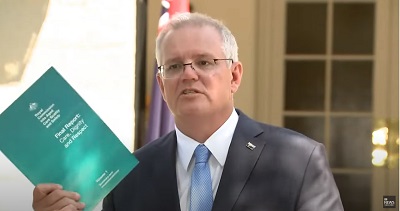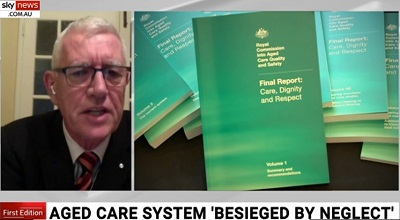There is no excuse in a wealthy, developed nation for policies of austerity that kill our elderly or ruin their remaining years of life. The policy agenda is driven by ideologies, scripted by think-tanks or consultancies and backed by big banks and big business. The scandal becomes infinitely worse when you recognise that even as those policies destroyed our public health capacity, the same authorities handed a virtually limitless money-printing machine to the corporate sector on a silver platter.
On 26 February the Aged Care Royal Commission handed down its final report, comprising 2,800 pages in five volumes, following over two years of hearings, with 641 witnesses and more than 17,000 submissions. Due to various media distractions, the conclusion of this extensive inquiry has not received the attention it deserved.
The report describes the flaws in the aged care system as a result of the way successive governments have viewed the sector—“as a form of welfare for the very needy, to be provided to the bare minimum extent required”. Continued the report: “the history of aged care policy is a history of decisions about how much the Australian Government is willing to spend on the care of older people”. The current Aged Care Act, brought in by the Liberal government of John Howard in 1997, is focused “on restraining expenditure rather than on the rights of older people to the care that they need”, the report spelled out. The application of an “efficiency dividend” and “rationing” of care places justified further expenditure reductions. The commission estimates that around $9.8 billion was missing from the 2018- 19 budget for aged care due to the collective decisions of successive governments since the Act was introduced!
The Royal Commission’s 148 recommendations are oriented to ensuring quality aged care is framed as a human right under a new Aged Care Act and that care is provided according to need.
The recommendations include:
- Improved governance of the sector, including a System Governor and Inspector-General and a comprehensive delivery, rating and reporting system along with a more stringent quality regulator.
- Increased staff ratios, including at least one nurse on duty at all times, better training of staff and higher wages.
- Measures to increase availability of in-home care.
- Phasing out of Refundable Accommodation Deposits.
- An increase of funding, via various proposals from an aged care levy to bond issues.
Health and Aged Care Minister Greg Hunt reportedly pledged to rip up the Aged Care Act 1997, saying reform would be “based on a simple concept of respect for the individual, instead of being about providers, instead of it being about money”, but only action—not words—will be tolerated by the families of the many elderly people horrifically abused, mistreated or who died too soon within the aged care system.
You can’t leave it to the market
Professor of Health Services Research and Director of the Australian Health Services Research Institute (AHSRI) Kathy Eager and AHSRI research fellow Anita Westera, both from the University of Wollongong, assessed the findings in an article published by public policy expert John Menadue’s website, Pearls & Irritations. Numerous failings were recognised by the royal commission, they wrote, but “there has been no questioning of the underlying assumptions about aged care as a market”. There were many areas of disagreement among the two commissioners, Lynelle Briggs and Tony Pagone, so alternative solutions were posed. The issues on which the commissioners were in agreement and made firm recommendations are the “low hanging fruit”, wrote the authors, namely issues that have been discussed in numerous forums over two decades, but deeper issues which will not go away were not addressed, such as “whether aged care should be planned and regulated as a public good or as a competitive market”; whether aged care “should be contracted out to private providers” for profit; and how to better integrate aged care and health care.
Asked on Sky News on 2 March, following the release of the report, about the prospects of shifting the aged care situation within the next five years, National Seniors Australia Chief Advocate Ian Henschke declared that “anything can be achieved with political will”. Referring to our World War II experience and past transformations of education and healthcare which included rapid training programs for teachers and nurses, he assured host Peter Stefanovic that anything is possible, but “government will have to play a role”. You can’t just say, “market forces will sort it out. Market forces have got us to where we are today and that’s why you’ve got to question everything about the system that exists today, and rebuild it”. Australia spends half as much on aged care as other less populated countries, said Henschke, and proposed large training centres in cities in every state to churn out tens of thousands of new, qualified staff within six months.
Henschke reiterated that the rot dates back to Howard’s 1997 Aged Care Act. Standards of care were axed and the system set up as a cash cow with virtually no oversight or accountability. Under what is essentially a “Ponzi scheme” model, based on investing interest-free Refundable Accommodation Deposits paid by residents, raking in government grants, and avoiding tax, private aged care providers were posting profits nearly four times that of their overseas counterparts and 10 per cent higher than domestic publicly-owned operators, the Saturday Paper revealed in a feature published 12 and 19 September 2020 (“Aged care is not a cash cow—return it to public responsibility!”, AAS, 7 Oct. 2020).
The Howard government (1996-2007) implemented policies of deregulation, privatisation and outsourcing of public services, devised by a global cooperative of neoliberal think tanks led by the Mont Pelerin Society. Numerous members of Howard’s cabinet were members of Mont Pelerin fronts including the H.R. Nicholls Society and Institute of Public Affairs. (“The neoliberal take-down of Australia’s health care”, AAS, 12 Aug. 2020). Howard’s Health Minister Michael Wooldridge now benefits from the crisis in aged care, working for Aspen Medical, the global health services provider contracted to provide replacement aged care workforces during the COVID-19 disruption, and he previously ran a managed investment fund that owned retirement villages; Howard’s other health minister was (later PM) Tony Abbott, a hardcore neoliberal ideologue for whom free trade is a religion.
With the number of Australians turning 85 set to double over the next 30 years, change is urgent. Funding will be a non-issue if the Australian economy is revived with the Citizens Party’s proposed revolution in banking, to include postal and national banks.
By Elisa Barwick, Australian Alert Service, 10 March 2021








